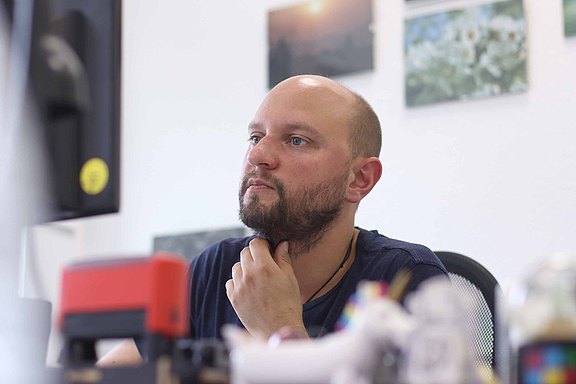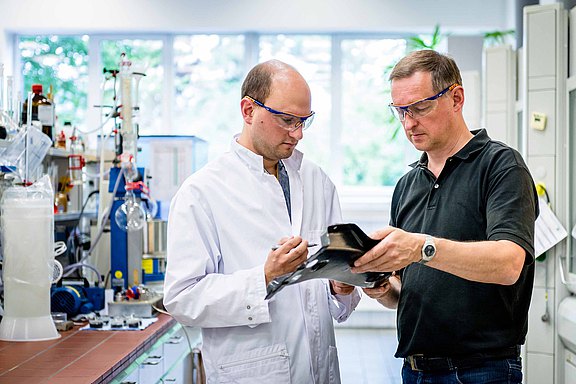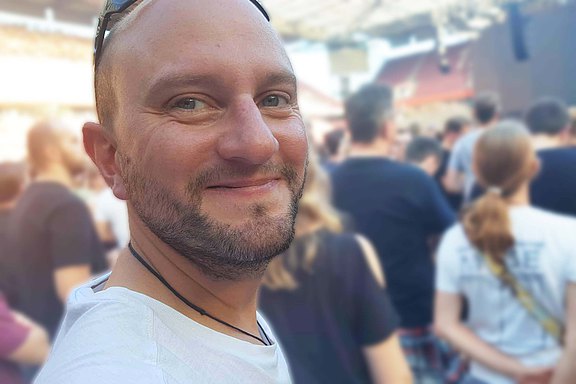Monday afternoon, 3.30 pm in Rudolstadt Breitscheidstraße.Tobias Biletzki is sitting in his office on the first floor and poring while making this always same gesture when he tries to solve a problem: Thumb and forefinger are pinching and picking the beardline at the throat. He is sitting at the big, tilted windows of the old industrial building from the 1950s and gazing at his PC screen which displays a scientific text and a complex formula. Little later, he throws on the white coat and goes down to the laboratory again to test something.
Be able to research, be able to test – even when risking that something goes wrong. These opportunities at a business-related research institute have always fascinated him. On May 1, 2014 the graduate chemist, who had just got his PhD in natural sciences, started work at TITK as a scientific associate and project leader of the department “textile and materials research”. He has never regretted this decision, Biletzki says.”I always wanted to work in the chemical sector to make it greener and cleaner.”
New catalytic process on the “green way”
Withhin the framework of his doctoral thesis, he was already looking for a new catalytic process to manufacture basic modules of psychotropic drugs. They might help against Alzheimer’s disease, but also against cancer and other pathologies. “This even simpler trail to produce basic modules should be blazed under ‘green flag’, Biletzki stresses. With a grant of Deutsche Bundesstiftung Umwelt (DBU) he planned to substitute organic solvents with more environmentally-friendly ones and, moreover, to optimize further process steps.
In his research projects now, after seven years at TITK, he pursues the question of how to deal with plastics – of biological or artificial origin – even more sensibly after their product lifecycle. “You invest a lot of energy to produce these materials. Therefore, it would be a shame if they could not return this energy some day.” In his first project at TITK, a procedure to utilize waste of biodegradable plastics in biogas plants energetically was developed. Thus, electricity and heat can be produced. “It then has a much higher cost-benefit factor than pure combustion”, the chemist explains.
Carbon fiber as material for sewage purification
Carbon fiber reinforced plastics – predominantly for lightweight construction applications in aviation and automobile industry - have been one main research topic at TITK. Dr. Biletzki is enthusiastic about an entirely new application area: sewage purification. “One has already managed to construct the almost perfect carbon fiber,” he says. On the way to date, a lot of alternative sources for producing carbon fibers were not explored further because of arising imperfections. The same applies for a lot of other fibers with worse mechanical properties. Due to their many imperfections, these fibers, however, have the charm to be potentially used in sewage purification as an alternative to activated carbon.”
Biletzki is convinced that the three already existing purification steps in sewage technology – mechanical, chemical, and biological purification – will not be sufficient in the near future. Since more and more harmful substances gather in sewage, in even higher and higher concentrations. His conclusion: A fourth purification step will have to come. “For this, I would like to produce filter materials from carbon fibers or also from alternative raw material sources in order to take advantage of exactly these imperfections in the material. Harmful substances can easily stick to them.”
Currently, Biletzki is pursuing his theory in two research projects. The material he uses for that is of two origins: on the one hand, carbon fibers from conventional production or also carbon fibers based on renewable resources (such as cellulose) are applied. On the other hand, bio-based material shall serve as basis for sewage treatment.
The bio-based carbon material shall be inserted in a yet to be developed filter module, which then will do its job in the sewage plant. Cherry pits, peanut shells, and many more things which have had to be disposed as waste so far, could be converted in corresponding active carbon material via pyrolysis and carbonization. “Thereby, we have renewable resources as basis and, in addition to that, a possible way to a fourth purification step.”
Almost stranded as a carer in Scotland
Where did his fascination of chemistry arise? As it is often the case, the subject teacher at school gave the decisive impulse. In later years, Tobias Biletzki would have almost become a carer in Scotland, as he found his fulfilment as caregiver for disabled children during his alternative service. But then he decided anew in order not to commit himself to one life perspective too early. “Try chemistry first”, he told himself, “and you will always have the opportunity to do the other job later.”
Looking back, it was the logical consequence as he could reach all his aims during his chemistry studies with low effort due to his prior knowledge and his preferences. He chose Friedrich-Schiller-University in Jena because it was known as best university for chemistry studies in Germany at that time. “And I would claim it still is,” Biletzki says.
In his free time, he plays basketball and soccer, loves reading, especially Stephen King. And he is an avid fan of Martin-Luther-King, who lives according to whose famous speech of 1963 (“I have a dream”). For, if you really want to achieve something, you should never slow down and never lose sight of your goal.
As young teenager he negotiated with a Berlin mayor
At the age of 14, Tobias Biletzki took that position literally. He was born in Erfurt and grew up in Berlin. One day, as a young teenager living in the capital, he wanted to go to a concert of the “Tote Hosen”. His parents were not at all enthusiastic. “If you ask the mayor and he says yes, you are allowed to go there,” his mother said. Tobias Biletzki did not hesitate long and phoned the mayor of the district of Pankow who agreed to his request. With one restriction: “You have to be at home before 10 pm.”
At that same time, Biletzki is often sitting together with a very good friend in Jena having a beer and thinking about new ideas for projects. They then often philosophize about potential innovations or individual issues. Then they commonly search the state of the art and think about taking it up a notch. Then these ideas are driven further in daily professional life at TITK in Rudolstadt. “The exciting collaboration among the colleagues in a business-related research institution and the cooperation with customers from industry is the perfect mixture for me”, Biletzki is enthusiastic about his workplace. “If I had known before that this exists, I would have wanted exactly this.”
Author: Steffen Beikirch, TITK


